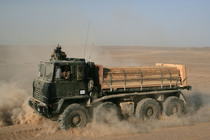 One of the most frequent complaints that you hear from those who have served in Afghanistan is that DFID is simply not fit for purpose. In an interview with The Sunday Times, Stuart Tootal, the commander of 3 Para who recently quit the army, gives a depressing example of how the DFID bureaucracy puts obstacles in the way of necessary projects:
One of the most frequent complaints that you hear from those who have served in Afghanistan is that DFID is simply not fit for purpose. In an interview with The Sunday Times, Stuart Tootal, the commander of 3 Para who recently quit the army, gives a depressing example of how the DFID bureaucracy puts obstacles in the way of necessary projects:
“The hospital sheets were filthy and the doctor said they couldn’t wash them,” he explained. “But we said, ‘You have an industrial washing machine sitting there in cellophane.’”
The US aid agency that had donated it withdrew when the British arrived so it had never been installed.An engineer with Tootal said that could be rectified, but they had not reckoned with the Department for International Development. It saw aid as its area and disliked “quick impact” projects.
“They didn’t want the military going into hospitals and they said we would tread on the toes of an aid agency even though it wasn’t doing anything,” said Tootal. “I said, ‘It doesn’t have to be done under the cloak of 3 Para. We can dress ourselves up as Afghans, do it at night. We just need to fix it.’”
The government officials refused, so for the whole of 3 Para’s six months in Helmand, the machine sat there in its plastic wrapping.
In the kind of operation that British troops are engaged in in Afghanistan, it is imperative that the aid and military strategies are integrated. It is absurd to try and make projects in a war-zone jump through the same bureaucratic hoops as elsewhere.







Comments